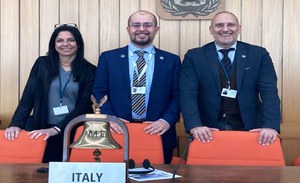Marine pollution caused by the dumping of wastes and other matter from ships and aircraft
ISPRA continues in the collaboration for the implementation of the London Convention and the 1996 Protocol on the prevention of marine pollution caused by the dumping of wastes and other matter.
- https://development.isprambiente.gov.it/en/news/marine-pollution-caused-by-the-release-of-substances-and-waste-from-ships-and-aircraft
- Marine pollution caused by the dumping of wastes and other matter from ships and aircraft
- 2024-04-15T00:00:00+02:00
- 2024-04-19T23:59:59+02:00
- ISPRA continues in the collaboration for the implementation of the London Convention and the 1996 Protocol on the prevention of marine pollution caused by the dumping of wastes and other matter.
- When Apr 15, 2024 to Apr 19, 2024 (Europe/Berlin / UTC200)
- Where London
-
Add event to calendar
iCal
At the headquarters of the International Maritime Organization (IMO) of the United Nations in London, from 15 to 19 April 2024, delegates from 40 countries and 7 non-governmental organizations gathered for the 47th meeting of the "Scientific Groups" of the London Convention, 1972 and the 18th meeting of the London Protocol 1996.
This year the meetings were chaired for the first time by Cristian Mugnai, an ISPRA technologist who has long been involved in these international bodies. The role of Chair will have a maximum duration of four years.
In order to contribute to the various topics on the agenda, four ISPRA experts also attended the meetings. The topics involved the examination of marine geoengineering techniques aimed at combating climate change, the capture and sequestration of carbon dioxide into sub seabed geological formations, the disposal at sea of port sediments as beneficial reuse of natural material and the monitoring that must follow every type of disposal, the management of decommissioned fiberglass vessels and the definition of actions to minimize sources of marine pollution from waste, including marine litter and microplastics.
The contributions presented by ISPRA technicians were focused on the Italian legislation, on the first experimental project for the capture and sequestration of CO2 in a decommissioned natural gas field and on the analysis of the interactions between climate change and toxicity measured in a natural population of sea urchins
Finally, the progress of working group 43 of the GESAMP (joint Group of Experts on the Scientific Aspects of Marine environment Protection – which provides advice to the United Nations system ) on marine sources of waste, to which contributed an ISPRA researcher.

